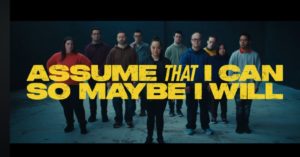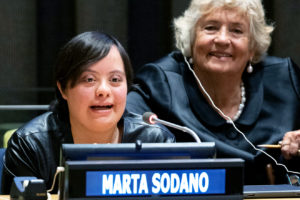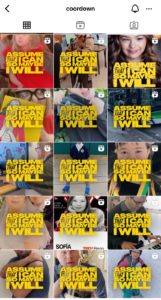Read & Discover
Challenge the self fulfilling prophecy
Kshitij Pipaleshwar
With 30 million views in less than 5 days, the campaign ‘Assume That I Can’ is becoming an unstoppable force in challenging the stereotypes associated with Down syndrome.

With World Down Syndrome Day (March 21) right around the corner, an ad campaign ‘Assume That I Can’ (watch it here : https://youtu.be/9HpLhxMFJR8?si=epS9VZxgqQir7-SB) is taking social media by storm and boldly challenging the stereotypes, notions and biases that society holds about people with down syndrome. The ad campaign by CoorDown and Small in association with the National Down Syndrome Society (NDSS) stars model and actress Madison Tevlin, 22, who has Down syndrome.
So what is the campaign all about?
The ad begins with Madison’s direct gaze into the camera addressing people from various walks of life (bartender, parents, coach and teacher) in different settings, confronting them on their assumptions, assumptions that do not allow her to explore her full potential, achieve important milestones and be independent. From bartenders who do not serve them (people with disabilities) alcoholic beverages to overprotective parents who continue to infantilize their children, to coaches that assume that disabled people can’t be athletes and teachers who do not include them in intellectually challenging pursuits, every group is questioned by Madison. She urges that if their assumption that “she CAN’T” results in her not being able to do something because she doesn’t even get to try, then maybe their assumption that “she CAN” will yield different results. The second part of the ad features Madison with the people she addressed in the first half with an alternate ending of all the scenarios, the one in which they show faith in her capabilities and encourage her. With their assumptions not holding her back, Madison can enjoy a margarita, party, live independently, work, swear, have sex, recite Shakespeare, and train harder. Free from the assumption of what people with down syndrome can and can not do, she can experience the whole range of her humanity, joy, potential and pursuits.

Recipe for success: Guide to getting it right
Collaboration with a capital C. Centring people for whom this is a lived experience. Centering their experiences and casting them. While spearheaded by CoorDown, several international organisations like Canadian Down Syndrome Society, National Down Syndrome Society, Global Down Syndrome Foundation, Down’s Syndrome Association UK, Down Syndrome Australia, New Zealand Down Syndrome Association, and Fundació Catalana Síndrome de Down have been associated at various stages of production and promotion.

A speech by Marta Sodano at the World Down Syndrome Day Conference at the United Nations in 2019 was the inspiration behind the campaign concept. In her powerful speech she mentions, “I discovered that in psychology there is a concept called ‘self-fulfilling prophecy,’ whereby a teacher who thinks that a student cannot understand would just act accordingly and therefore would not teach the student. And there you go: the prophecy self-fulfills. In my opinion, there are not difficult or easy concepts, there is always a simple way to explain things. If I think of all the things that were not explained and taught to me, well I get really angry.” She went on to add that the people who were most helpful were the ones who saw her only as Marta and not a Down’s syndrome person.
Madison Tevlin who dons many hats- actor, model, activist is the soul of the campaign. She single-handedly carries it and how! With phenomenal screen presence, her piercing gaze makes you confront your own biases, and the joy of seeing her emerge triumphant in face of prejudices is contagious.
So there it is. Platform the ones who live through it. Listen to their experiences. Incorporate them. There are actors, models, artists, musicians, people from all trades and walks of life who live with disability, cast them. Consciously.
Gaining Momentum

As the campaign hit social media, people with down syndrome started sending in their videos of the assumptions people make about them and how they subvert them. From Jordan Grace who skis to Connor who has won an Emmy, contributions have been pouring in from across the world. Alex shows off his tattoo, Andrea plays piano, Sofia Sanchez is a TEDX speaker, Vincenzo challenges the idea that people with down syndrome can’t have a relationship by showing off his wedding photo, Charlotte shares a photo of her at college, David skates, Emma holds an important position at work, Luka is a power swimmer who represents his country (New Zealand), Marina Cuollo is a writer, Monika Myers is a runway model, Franceso plays violin, Annika is a model, Sam trains in Aikido, Chris Nikic completed Ironman, and the list goes on. The contributions go on to highlight that boxing an individual based on one aspect of their being, denying them opportunities based on one’s own prejudice and carrying low expectations, all have the same consequence – holding them back. Even when disguised as protection, this stereotyping still limits people with disabilities.
The proverbial ‘Cherry on the top’
 Reinforcing that being disabled and wanting to live up to your potential does not just mean working towards intellectual or professional pursuits but it means embracing the whole spectrum of emotions, relationships, opportunities, milestones that are offered to people without disabilities. The freedom to swear, desire and wanting to be desired, exploring one’s sexuality, partying, so on and forth. The campaign does not shy away from this aspect that often gets overlooked when the topic of disability and limitations is discussed. Kudos to the team from including this in the script.
Reinforcing that being disabled and wanting to live up to your potential does not just mean working towards intellectual or professional pursuits but it means embracing the whole spectrum of emotions, relationships, opportunities, milestones that are offered to people without disabilities. The freedom to swear, desire and wanting to be desired, exploring one’s sexuality, partying, so on and forth. The campaign does not shy away from this aspect that often gets overlooked when the topic of disability and limitations is discussed. Kudos to the team from including this in the script.